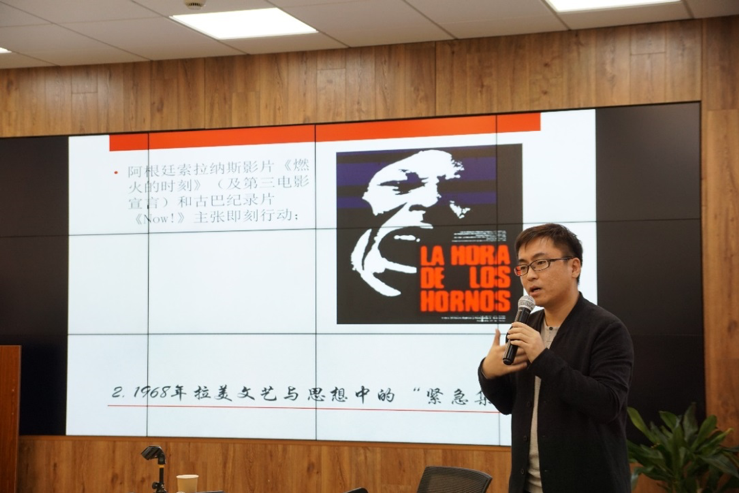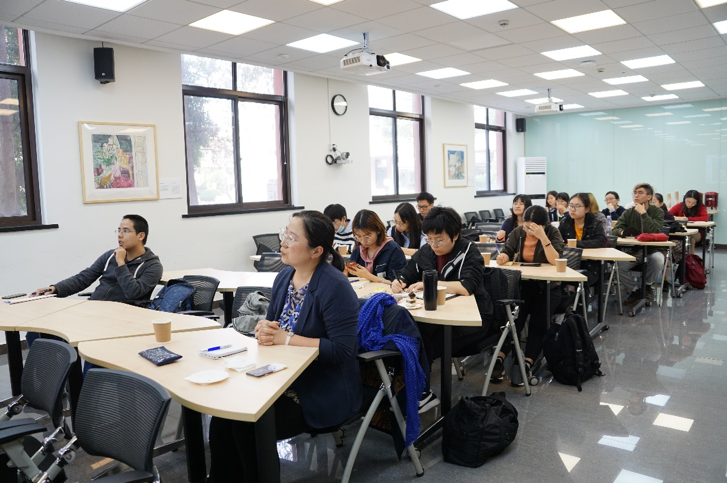The eighth lecture of “Latin America and China” series was successfully held by Fudan Development Institute and College of Foreign Languages and Literature at 13:30, 26th October, 2018. The main topic of the lecture is “Latin American Literature, Third World and Intellectual Issues in 1968” and the speaker is Doctor Wei Ran, who works in the Institute of Foreign Literature of Chinese Academy of Social Sciences. He has been a visiting lecturer at the University of the Andes in Venezuela (2007) and the University of Gutenberg in Germany (2008). In 2010-2011, he visited the Department of Roman Language and Literature at Duke University in the United States for one year, and in 2016, he went to Buenos Aires Latin American Social Science Council for a research visit. More than thirty people including students and teachers from Fudan University were presented.

1.Dr. Wei Ran illustrated the classification of the “sixties”
Dr. Wei Ran started his lecture from the perspective of social history and intellectual history, analyzing the extraordinary concept of time --- the sixties and entering Latin America under the background of global upheaval. He explained to us the important turning point in Latin America around 1968, when the cultural, economic, political and international situations are linked.
Dr. Wei Ran first introduced the social background of Latin America in the 1960s. Many reasons, including the desire for international soft power, the dissatisfaction caused by the economic and political undeveloped situation, the inequality of the international community, the spread of left-wing thoughts and the revolutions and rebellions, all these have become the basis of ideological changes in Latin American literature and art. The publication of One Hundred Years of Solitude and the awards for Vargas Llosa have enhanced the international reputation of Latin American literature. The Latin American literature and culture have its position consolidated in the international community, and the Latin American writers and artists have finally become the organic intellectuals. At the same time, influenced by the dependency theory, there has been an emergency assembly in Latin American literary thought, demanding an urgent change in the status quo. The famous Open Veins of Latin America echoes this atmosphere.
Dr. Wei Ran also pointed out that the development and growth of the third world has also profoundly exercised influence on Latin American literary thoughts. With the same idea of the Bandung Conference, the spirit of solidarity was introduced by Cuba to Latin America. Cuba’s film creations emphasized “three continents”, represented by Alves. Overcoming the difficult conditions, He produced a lot of excellent works, such as the news documentary Bald Mountain, avant-garde art film Hanoi: Tuesday, 13th in support of the Vietnamese people's resistance to aggression.

2.Over 30 students and teachers have attended the lecture
Talking about the intellectuals in Latin America in the 1960s, Dr. Wei Ran believes that Latin American writers become organic intellectuals and are the result of the coupling of multiple forces. In the social transformation, the politicized culture is getting stronger and stronger, and the emergence of new revolutionary subjects has also led to the emergence of new writers and new reader groups, which has a profound impact on Latin American realist literature and the creative thinking of Latin American writers.
The series lecture of “Latin America and China” invites well-known experts and scholars in the field of Latin America studies from China and abroad, covering a wide variety of issues including Sino-Latin America economy, politics, society, international relations, culture, literature, film and media.The series lecture has not ended yet, please follow the Wechat subscription account of Fudan Development Institute(“复旦发展研究院”) to get the latest news.
Edited by LUO Xiaonan
Translated by WANG Longxing
Photo by LIU Siyuan